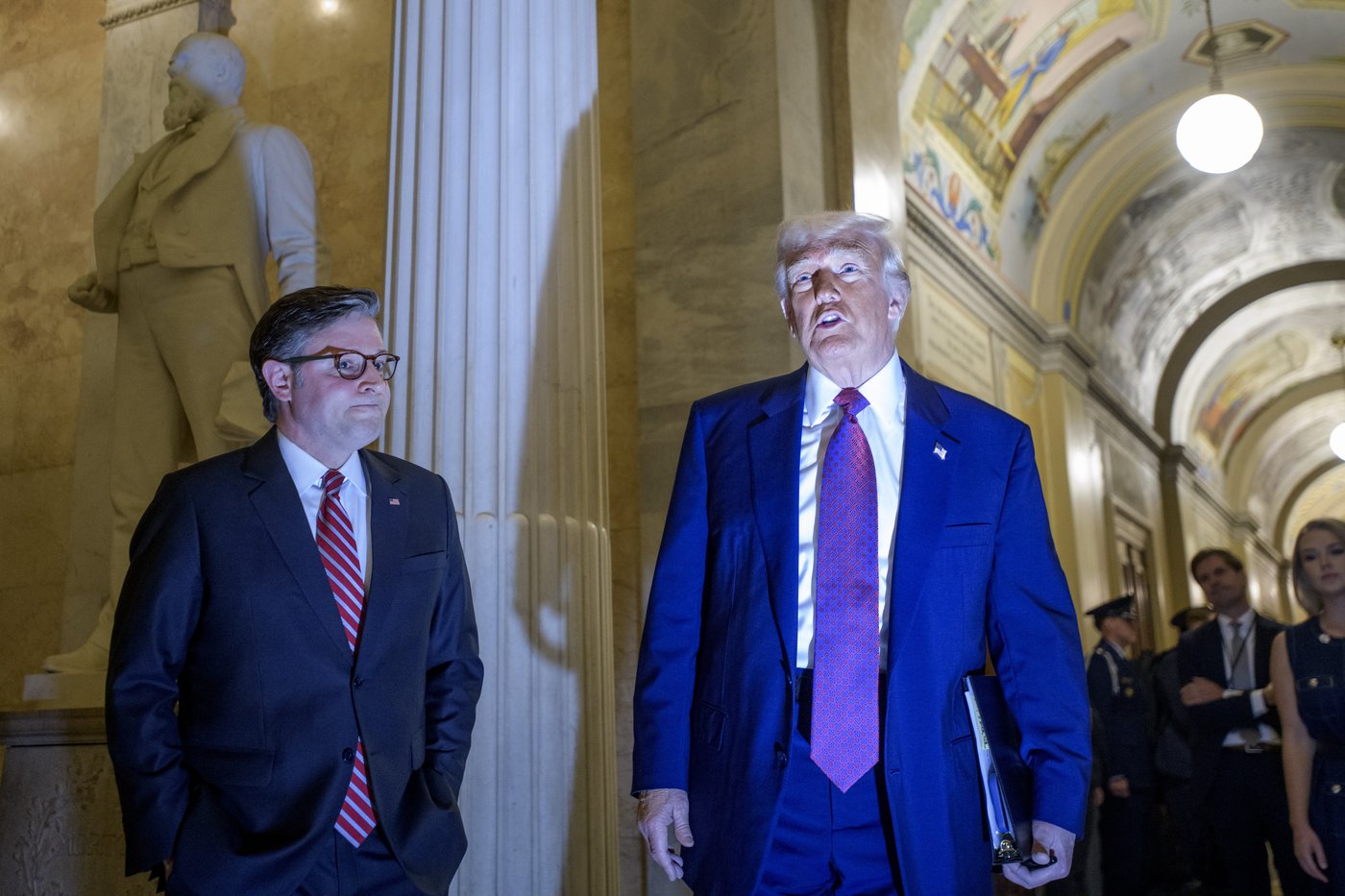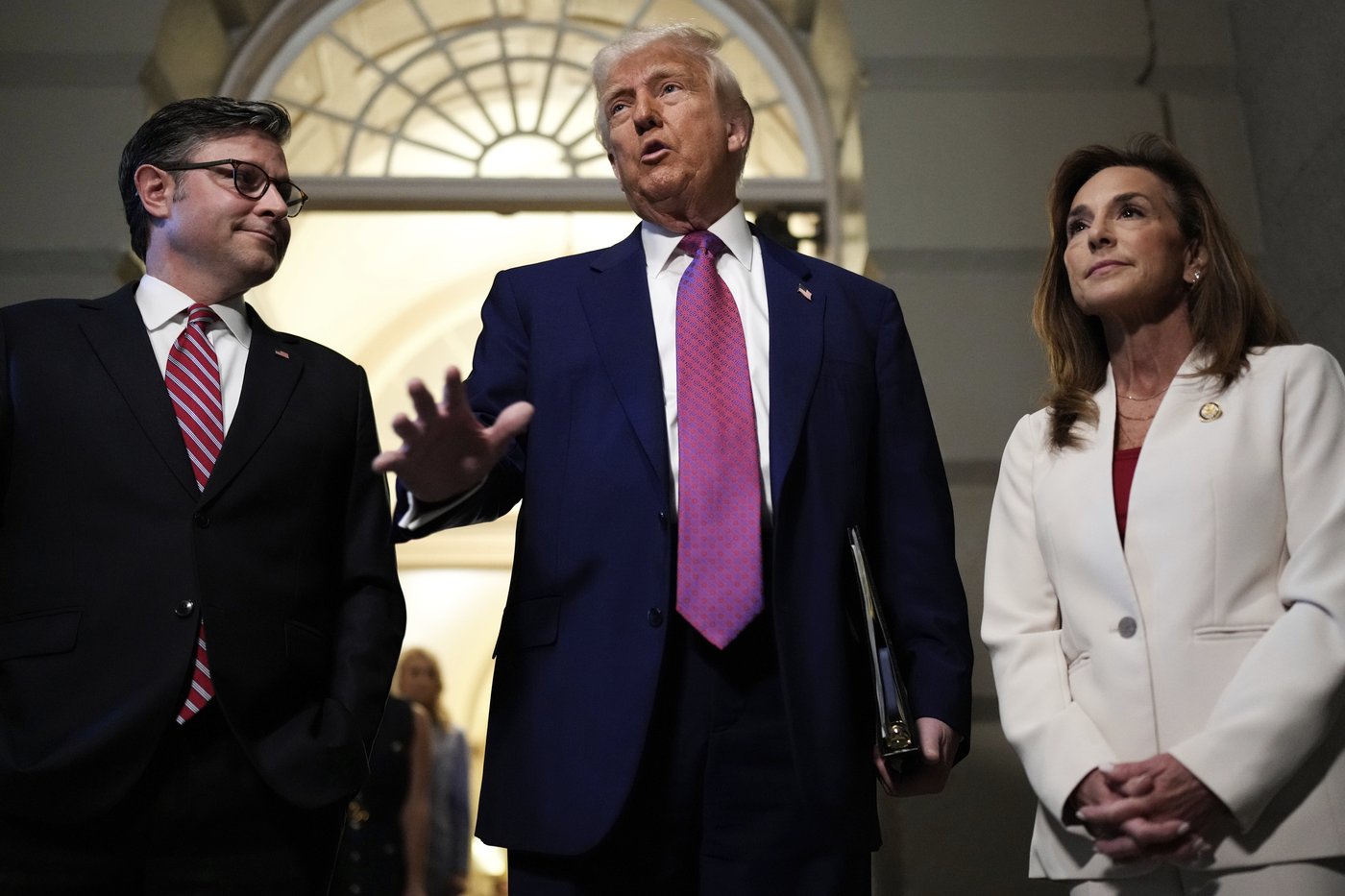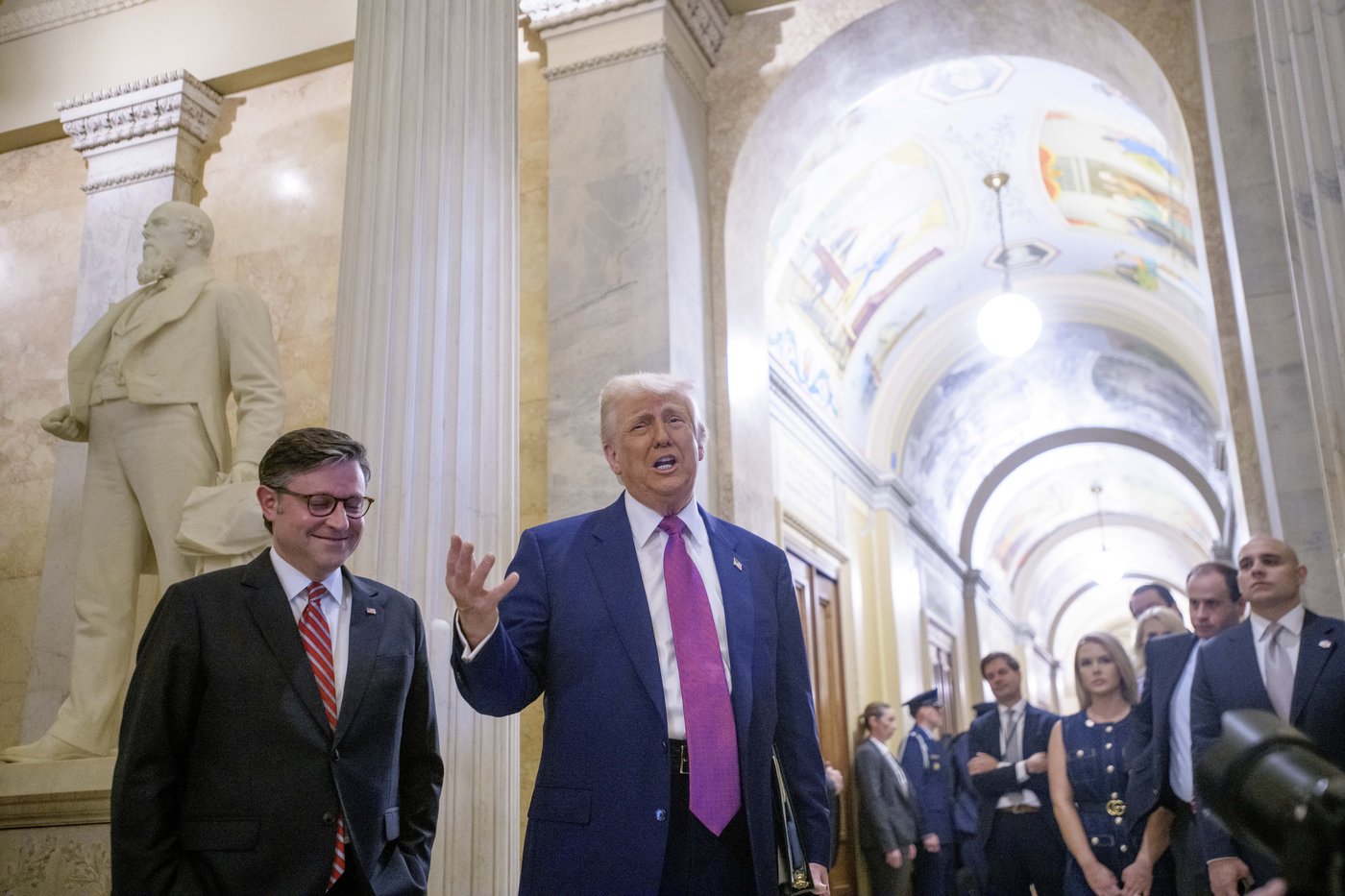Johnson Vows to Press On with Trump’s Major Bill Post-White House Meeting
WASHINGTON (AP) — Despite dissent among his members, House Speaker Mike Johnson firmly stated late Wednesday that Republicans would continue with their plans.
multitrillion-dollar tax breaks package
following an extended White House discussion with Republican dissenters unwilling to support the legislation.
Johnson and his Republican leadership group seemed assured that they could maintain their timeline and strengthen GOP backing for the final approval late Wednesday or Thursday after last-minute discussions aimed at rescuing the situation.
“big, beautiful bill.”
However, the subsequent steps remain quite unclear.

“We’re thrilled that we’ll be landing this aircraft,” Johnson, R-La., stated from the Capitol.
As the evening progressed, the cheerful atmosphere clashed with the chaotic situation unfolding at the Capitol. The Rules Committee had been engaged in an extensive hearing for over 18 hours, moving slowly but steadily forward. At this point, another Republican, Representative John Rose from Tennessee, declared his stance against the GOP’s proposal. Meanwhile, lacking sufficient votes to block Trump’s plan, the Democrats were employing every possible strategy and delivering passionate addresses to voice their dissent and take advantage of the Republicans’ internal discord.

“We think this is just one large, unpleasant expense that will harm the American citizens,” stated the House member.
Democratic leader Hakeem Jeffries
in New York as he and his team gave testimony to the committee.
“Hurting children, damaging families, affecting veterans, disadvantaging seniors, reducing healthcare, cutting nutritional support, and increasing the debt,” was his statement.
It’s a make-or-break moment for the president and his party in Congress. They have invested much of their political capital during the crucial first few months of Trump’s return to the White House on this legislation. If the House Republicans fall in line with the president, overcoming unified Democratic objections, the measure would next go to the Senate.
Trump had urged the legislators at the Capitol just one day before to push forward with their efforts, yet they remained unconvinced. The details of what transpired—or didn’t—during Thursday’s extended discussion at the White House remain ambiguous. Nonetheless, Johnson suggested post-meeting that certain objectives which Congress couldn’t reach consensus on through legislation might potentially be achieved via presidential action under Trump’s leadership.
The White House press secretary, Karoline Leavitt, stated that the discussion was fruitful and advanced matters positively.
A significant issue arose concerning the provisional agreement reached with Republican legislators from New York and several other high-tax states aimed at increasing deductions for local taxes up to $40,000. However, this expensive measure, which could cost trillions of dollars, caused concern among the more conservative Republicans who feared it would further increase the national debt.
$36 trillion debt
.

With each segment of the narrow House majority that Johnson tries to please, he runs the risk of alienating others.
Representative Andy Harris, R-Md., who chairs the far-right House Freedom Caucus, previously stated that he didn’t think the bill would be able to clear the House through a vote. However, he now sees “a potential path forward.”
A new assessment from the Congressional Budget Office indicated that the tax measures would lead to an increase in federal deficits of $3.8 trillion over ten years.
changes to Medicaid
, food stamp benefits and other assistance programs could lead to a decrease of about $1 trillion in government spending. According to the CBO, this would result in lower resources for America’s poorest families but an increase for those at the higher end of the income spectrum.
Essentially, the package focuses on expanding the tax cuts implemented under President Trump’s initial tenure in 2017, along with incorporating additional measures that were part of his platform during the 2024 election campaign.
In an effort to recoup some of the lost revenue, the Republicans are concentrating on reducing expenditures related to federal safety-net programs along with implementing significant budget cuts.
reversal of tax incentives for green energy
From the Inflation Reduction Act of the Biden era.
Furthermore, the package adds an additional $350 billion in new expenditures, with roughly $150 billion allocated to the Pentagon, including funds for the president’s new “
Golden Dome” defense shield
and the remainder for Trump’s
mass deportation
and border security agenda.
The package title includes Trump’s exact words, the “
One Grand Spectacular Legislation Act
.”
Like Trump vowed to his supporters, the proposal suggests this would occur.
no taxes on tips
For specific employees, such as those working in particular service sectors; financing interests for vehicles; or additional earnings from extra hours.
The standard income tax deduction would rise to $32,000 for couples filing jointly, along with an increased child tax credit set at $2,500. Additionally, older individuals within specific income brackets could claim a higher deduction of $4,000 to offset their taxes on Social Security benefits.
In order to reduce expenditures, the plan introduces new work obligations for individuals receiving healthcare via Medicaid. For able-bodied adults without children, this requirement entails dedicating at least 80 hours per month either to employment or engaging in various communal activities.
In a similar vein, individuals receiving benefits from the Supplemental Nutrition Assistance Program, referred to as SNAP, would likewise be subject to new work requirement rules.
Americans aged up to 64, instead of 54, who are fit and do not have dependents will be required to work or participate in community programs for at least 80 hours each month. Furthermore, certain parents whose children are over 7 years old may also need to meet these work obligations; currently, this rule applies only when their children reach 18 years of age according to existing laws.
Republicans stated their aim is to eliminate waste, fraud, and misuse within the federal initiatives.
The Congressional Budget Office estimates that under the proposed modifications to Medicaid and the Affordable Care Act, approximately 8.6 million fewer individuals would retain their health insurance coverage. Additionally, they report that monthly participation in SNAP could decrease by about 3 million people.
The Conservatives are pushing for faster and deeper reductions in federal programs to compensate for the substantial loss in tax revenues amounting to trillions of dollars. Republican leadership has moved up the implementation date for Medicaid work requirements from 2029 to 2027.
Meanwhile, more moderate and centrist legislators remain cautious about potential alterations to Medicaid that might lead to diminished healthcare access for their constituents. Some are concerned that phasing out the incentives for renewable energy could hinder companies from investing in environmentally friendly initiatives across various states.
Moreover, those legislators representing New York, California, and other areas with higher taxes aimed to increase the state and local tax deduction, known as SALT, for the constituents in their regions.
As part of the developing SALT agreement, the current $10,000 limitation on deductions would increase fourfold to $40,000, capped at an income threshold of $500,000, revealed a source who wished to remain unnamed due to the confidential nature of the negotiations. For individuals earning over this amount, the deduction cap would gradually decrease.
The nonpartisan fiscal oversight organization known as the Committee for a Responsible Federal Budget projects that theHouse bill will result in
is shaping up
to increase the debt by approximately $3.3 trillion within the coming ten years.
__
Chris Megerian, an Associated Press writer, contributed to this report.
Lisa Mascaro, Kevin Freaking, Leah Askarinam, and Joey Cappelletti from The Associated Press